
Success can happen
By Andrew Joseph, Features Editor; Pierre Longtin, Photographer
General Allen-Bradley beer brewery CFT Packaging USA Consolidated Technologies Krones McAuslan Brewing Rockwell Automation SEW-Eurodrive Storcan Storcan Conveyor SystemsMontreal integrator’s ‘Can Do’ attitude helping popular microbrewer achieve faster production times and a consistently high-quality upscale beer.
(This article originally appeared in the June 2013 issue of Canadian Packaging magazine.)
Although founder Peter McAuslan actually began home-brewing his own beer back in the late 1970s, it wasn’t until the mid 1980s when he seriously began to think he would like to operate his own brewery.
In 1987, he turned that dream into a reality and quit his job as secretary general of the Montreal-based Dawson College, spending the next year organizing financing, leasing building space, gathering equipment and, most importantly, building a five-man team that would help turn his dreams into a successful reality. McAuslan’s wife, Ellen Bounsall, also quit her job as registrar with the school in order to help out.
Even though she wasn’t much of a beer drinker initially, she did occasionally enjoy her husband’s home-brews, finding the intrigue of the family owning a brewery compelling.
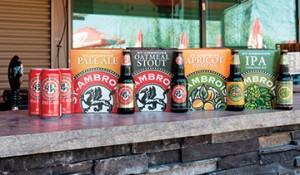
While McAuslan Brewing may be best-known for its award-winning Pale Ale, it also produces a diverse palette of flavors that has garnered international attention and acclaim.
Despite acquiring a brewery and all the essential equipment to get started, McAuslan and Bounsall were still seeking perfection in their beer recipe—finally discovering it in 1989 with creation of their St-Ambroise Pale Ale brand.
Since then, the British-style ale has been going from strength to strength in the intensely competitive Quebec beer market.
According to the company, St-Ambroise Pale Ale became a hit not only due to its distinctive hops flavor, but also thanks to its clear, bold red color that immediately set it apart from the competition.
By the end of 1990, the company saw its sales rise by a staggering 306 per cent—promptly positioning McAuslan Brewing to become the province’s largest microbrewery by volume.
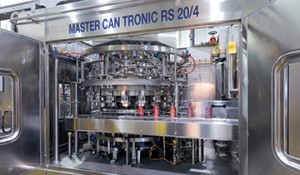
McAuslan Brewing plant’s recently-installed new Master Can Tronic model RS 20/4 filler and seamer from CFT Packaging USA can reach speeds up to 170 cans per minute.
Not one to sit back on his laurels, McAuslan and his team soon began to expand their line-up of beers that has clearly resonated with the tastebuds of an appreciative and thirsty customer base.
By 1992, the brewery expanded its production capacity to 20,000 hectoliters (the equivalent to 250,000 24-bottle cases of beer), and in 1995 it added a new filler and bright beer tanks to expand its capacity to 26,000 hectoliters.
That initial success laid foundations for a cheerful workplace environment for 65 employees at the lively, fast-paced Montreal plant, nowadays producing 90,000 hectoliters of beer annually.
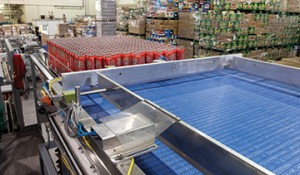
The new depalletizing system designed, manufactured and installed by Storcan specifically for McAuslan Brewing is a semi-automatic unit that lifts palletized empty cans one level at a time, so that workers can physically sweep the cans from the pallet onto an accumulation table leading to the filling line.
Over the years, McAuslan was greatly aided and abetted by his brewmaster wife in proceeding to launch many new and different beers with interesting flavors, but above all catering to the discerning beer-lovers across Canada, the U.S., Australia, Belgium and Switzerland.
Along with the seven beers McAuslan Brewing produces on year-round basis—St-Ambroise Pale Ale, St-Ambroise Oatmeal Stout (platinum winner at the 1994 World Beer Championships), St-Ambroise Apricot Wheat Ale, St-Ambroise India Pale Ale, St-Ambroise Cream Ale (draft only), Griffon Extra Pale Ale and Griffon Red Ale—it also produces six seasonal beers.
Consisting of the St-Ambroise Scotch Ale, St-Ambroise Maple, St-Ambroise Raspberry, St-Ambroise Pumpkin Ale, St-Ambroise Vintage Ale and St-Ambroise Russian Imperial Stout brands, these seasonal varieties all sell out virtually as quickly as they are brewed, according to the company.

Installed in 1996, this high-performance Krones bottle filler still forms the backbone of production capabilities for the busy McAuslan Brewing plant in Montreal that nowadays produces about 90,000 hectoliters of high-quality beer products annually.
“The beer business in Quebec is very price-driven, as in the less expensive the better, but that is not the McAuslan way,” McAuslan Brewing director of marketing Margo Pollock told Canadian Packaging magazine during a recent interview.
“We have successfully positioned ourselves as a high-end beer, and it’s a business plan that has worked well for us from Day One.”
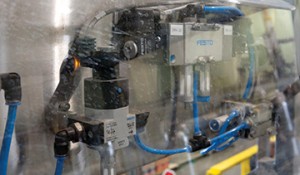
Close-up view of high-precision Festo pneumatic components incorporated inside the Krones filler for optimal filling accuracy.
According to Pollock, the company’s success in creating great new beers lies in its unique ability to marry high-quality ingredients with a boundless passion for the craft of brewing.
“We think that just like our customers, our beers should have their own distinctive character and personality,” she explains.
This customercentric mindset re-cently helped McAuslan Brewing take home the Gold medal from the Canadian Brewing Awards for its St-Ambroise Maple, with its Griffon Red brand also named Best Red Ale by Protegez-Vous, Quebec’s consumer report magazine.
To date, the brewery has garnered fans around the world, as evidenced by the fact its beers have captured almost 70 industry awards—with combined haul of 12 medals from international competitions including a platinum and several golds.
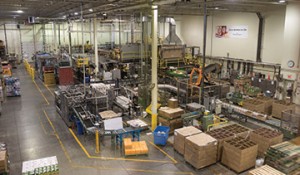
The McAuslan Brewing facility in Montreal uses Storcan-manufactured and installed conveyors on its bottle-filling and the new can-filling lines.
McAuslan decided to sell his company this past April to Les Brasseurs RJ, another successful Montreal-based microbrewer who wisely decided not to mess with a good thing by allowing McAuslan Brewing to keep going about its business the only way it know how—with a large dash of innovation and integrity.
“Back in the early days, McAuslan Brewing was the first microbrewery to sell its beer in bottles,” points out Pollock, noting that back in 1995 the company was also the first Canadian brewery to have its own Internet website.
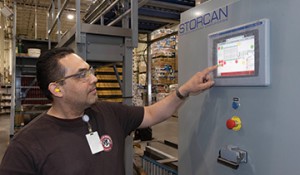
Brewery employee Raphael Villarrdel works the easy-to-use Allen-Bradley PanelView Plus 1000 terminal controlling the operation of the brewer’s new canning line.
Partnering up with Moosehead Breweries, Canada’s fourth-largest beermaker based in New Brunswick, introduced McAuslan to the world of co-packing for mass-produced beer brands—developing another key competency that was considerably strengthened with a subsequent co-packing partnership that Moosehead struck with the famed Danish beermaker Carlsberg.
“We must have done a really good job of it, because our batches were consistently ranked in the Top Four during Carlsberg global headquarters’ monthly quality review of its beers brewed around the world,” states McAuslan’s current brewmaster David Brophy.
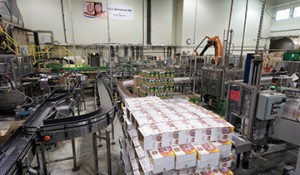
Storcan built and installed a smooth-running line of conveyor systems for transporting filled cases of beer to the plant’s palletizing area.
While Brophy agrees that innovation and hard work are the mother of necessity, he also points to the plethora of high-quality brewing and production line equipment that have made the tricky job of brewing a product on a consistent basis a much smoother proposition for him.
This includes the Krones filler that McAuslan purchased in January of 1996, which immediately generated a hefty increase in production line bottling speeds and achieved extended shelf-life for the bottled beer.
More recently, the brewery developed and maintained a healthy business relationship with Storcan Ltd., Montreal-based integrator who not only sold and installed production line conveyors to the brewery, but also recently supplied a brand new filler for plant’s brand new canning line.
Founded in 1976, Storcan is considered a leader in the bottling industry throughout Canada and the U.S. With three expansions, continuous acquisition of automated machinery, and formation of an inhouse engineering department, the company has developed a renowned expertise in many areas of the manufacturing industry.
“As strange as it sounds, Storcan’s involvement with McAuslan begins with me when I worked over at Krones,” relates Storcan vice-president of sales Jean St-Martin, who joined Storcan 15 years ago.

An SEW-Eurodrive motor keeps the can line humming as it moves empty cans down a spiral pathway into a rinsing unit.
McAuslan’s first Storcan purchase was a full conveyor system for a new bottling line, and since that worked out well, anytime the brewery requires advice or new equipment, Storcan is one of the first to get the call, St-Martin relates.
According to St-Martin, the new CFT Packaging USA model Master Can Model 20/4 filler can run at a top speed of 170 cans per minute, which includes filling and seaming the lid onto the can.
“The seamer and filler are all part of the same CFT filler,” notes St-Martin. “It really provides a high-quality seam on the can, which provides McAuslan excellent quality assurance.
“I know that CFT is the only manufacturer in the world that builds both the filler and seamer in-house, which helps provide the Master Can with a very compact design,” he adds.
According to Storcan, the Master Can is a rotary filler-seamer monoblock that relies on counter-pressure filling technology to fill metal or aluminum cans with volumes ranging from 100-ml to 660-ml.
Main features of the Master Can include:
- Centralized decompression recovery system;
- Filling valves complete with separate air return system from cans;
- Low-oxygen pick-up to avoid beer oxidation;
- CO2 fluxing to reduce air presence, foam formation and oxidation;
- Automatic height adjustment of the tank;
- Linking with CFT seamers equipped with bubble-breaker and CO2 injection before can seaming;
- External valve washing system.
“These value-added features of the filler also help us maintain oxygen pick-up to a minimum, ensuring consistent product quality,” says McAuslan’s bottling line manager Celine Maranger. “It is a key factor in a beer’s shelf-life.”
St-Martin candidly explains that Storcan only began work on the McAuslan can line project after detailed discussions with the brewery to ensure that both parties were on the same page, and that the beer producer was definitely getting the best bang for its buck.
“We supplied all of the conveyors for this new can line, as well as their new semi-automatic depalletizing system,” he relates.
St-Martin says that Storcan always works with the latest and most advanced computer technology for design and engineering, using the Allen-Bradley series HMI (human-machine interface) and PLCs (programmable logic controllers) manufactured by Rockwell Automation.
St-Martin says that although the McAuslan project was almost as simple as having them pick and choose items from a catalogue, there is still a certain amount of customization required from time to time, citing the brewery’s new depalletizing system that empties new cans onto the production line for cleaning and then filling.
“We had two criteria from McAuslan Brewing: make the depalletizing system as efficient as possible for their particular set-up; and keep the costs down,” explains St-Martin.
“So we did that by creating a specific semi-automatic system just for them.”
Storcan devised the new depalletizing system as a semi-automatic unit employing a mechanical lift
that raises a pallet filled with empty cans to the depalletizing station one level at a time. Once raised, a brewery employee simply sweeps the cans en masse onto the accumulation table and activates the depalletizer mechanically to move up—revealing another layer of cans.
Although well-known for its integration skills, Storcan is also one of the leading manufacturer of conveyor systems in North America for the food-and-beverage industries.
After being depalletized, the cans move in a single-file along the conveyors—powered by SEW-Eurodrive motors—before twisting down into a rinse gravity system for a thorough rinse.
Exiting the rinser, the cans continue along a Storcan conveyance system and enter the closed Master Can filler and seamer, before continuing their journey to a pasteurization system.
After the cans are packed into cases via a Consolidated Technologies case-packer, with paperboard supplied by a couple of companies including Rock-Tenn, they are hand-stacked onto a pallet and readied for transport to the various beer dispensing outlets.
“We have enjoyed our long-standing relationship with Jean and Storcan,” states Marenger. “Their machinery expertise has helped us to brew a consistently high-quality product that our customers really seem to love with a passion.”
Close-up view of high-precision Festo pneumatic components incorporated inside the Krones filler for optimal filling accuracy.
Advertisement


